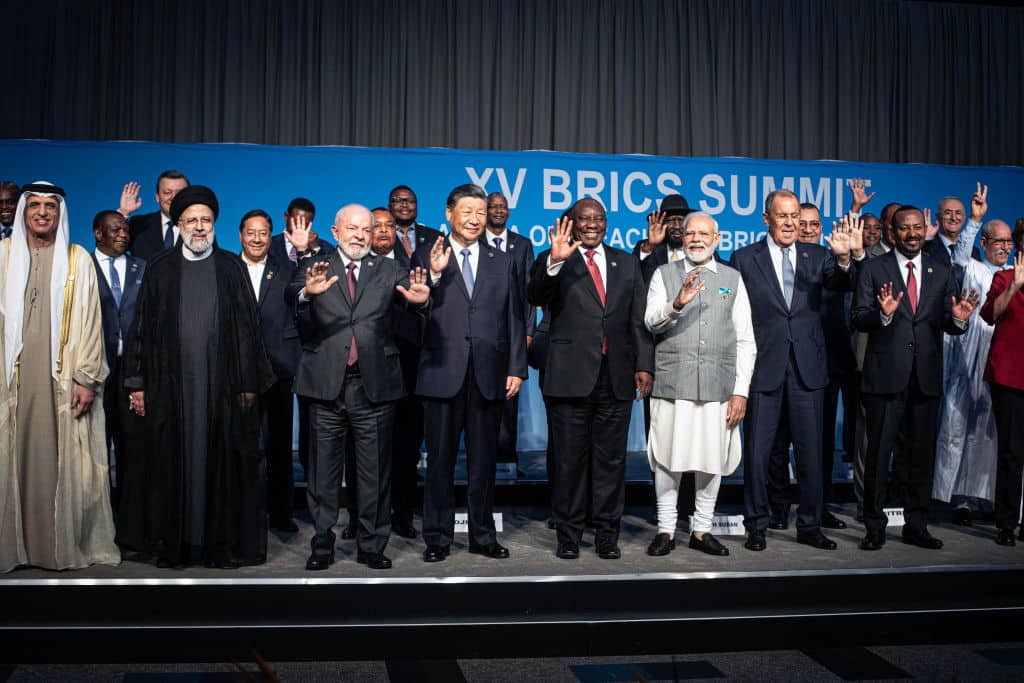BRICS’ expansion with five new members, set against Argentina’s decision to decline, presents a nuanced challenge to US influence, markin a complex evolution in international dynamics.
BRICS, the international governmental organization focused on bilateral relations, investment, and economic cooperation, has officially admitted five new member countries, effective from January 1, 2024. The inclusion of Saudi Arabia, the United Arab Emirates (UAE), Egypt, Iran, and Ethiopia effectively doubles the bloc’s membership to 10 nations, adding significant economic weight and potential. Notably, Argentina, one of the six countries invited to join BRICS, declined the offer under newly-elected President Javier Milei.
The formal admission of the new BRICS member countries follows last year’s summit in Johannesburg, South Africa, where the invitations were extended. South African President Cyril Ramaphosa, a proponent of the expansion, highlighted its importance for the Global South’s representation and the economic and trade development of member states.
“… South Africa stands to benefit from its relationship with these countries,” said Ramaphosa in a press release concluding the conference. “Together, these countries account for nearly a third of the global economy and are home to 46 percent of the world’s population.”
While the BRICS group (comprising of Brazil, Russia, India, China and South Africa) has long been viewed as an alternative to Western, particularly American, economic and geopolitical influence, independent risk and political analyst Marisa Lourenço in South Africa suggests that this expansion is unlikely to immediately disrupt the current economic order.
“The expansion of BRICS occurs in an era of multipolar politics, where countries can seek alternatives… and challenge US hegemony with different trading partners,” says Lourenço to FORBES AFRICA. “A BRICS currency seems highly unrealistic, and though trade between countries might increasingly use currencies other than the USD, it will take more to challenge the dominance of the USD in global trade.”
Loading...
The entry of Saudi Arabia and the UAE is anticipated to significantly enhance the global influence of BRICS. Both countries bring substantial financial resources and geopolitical clout, especially as prominent members of the Organization of Petroleum Exporting Countries (OPEC).
The economic implications of BRICS’ expansion are vast and varied. With the inclusion of major oil producers and emerging economies, the bloc is poised to redefine trade dynamics and create new investment opportunities. This could lead to a reshaping of global trade routes and partnerships, offering a diversification of economic alliances beyond the traditional power centers. As the bloc grows, so does its capacity to influence global economic policies, potentially leading to more equitable trade terms for emerging markets.
The addition of Ethiopia and Egypt marks a notable step in increasing African representation within the bloc, resonating with Ramaphosa’s remarks at the 2023 summit. However, Lourenço believes Africa will not likely dominate the BRICS agenda soon, with the strategies of larger member states expected to dictate overall direction.
Regionally, the impact of BRICS’ expansion on African countries, both within and outside the bloc, deserves a closer examination. For countries like South Africa and Ethiopia, this could mean enhanced access to markets and capital, fostering development and economic growth. However, the challenge lies in ensuring that these benefits are equitably distributed and that the voices of smaller economies are heard within the bloc. As BRICS evolves, its ability to address these regional disparities will be crucial in determining its effectiveness and relevance.
“Africa has improved representation… but overall remains the weakest link, with the economic sizes of both countries overshadowed by their peers,” states Lourenço. “It will be interesting to observe how Saudi Arabia deepens ties with the continent… especially as the kingdom has recently increased its investments in numerous African countries, alongside other Middle Eastern powers like Turkey, the UAE, and Jordan.”
Lourenço argues that China is the primary beneficiary of the BRICS expansion, being the bloc’s most influential member and a direct competitor of the US in strategic areas such as East African infrastructure and access to raw minerals. “Politically, BRICS’ expansion is particularly advantageous for China… The alignment of global powers like China, Iran, and Saudi Arabia within BRICS is likely to unsettle the US, which may perceive this as a direct challenge to its hegemony.”
The expansion of the bloc occurs at a critical juncture amid global economic and political tensions. BRICS faces the challenge of integrating member states engaged in conflicts with Western allies while maintaining relations with countries closely allied with the US. While BRICS has the potential to significantly expand its political and economic influence, Lourenço warns that this is not a foregone conclusion.
“If it can establish a formal institutional framework, it could become a powerful entity, but member disagreements make this unlikely in the next two to three years,” Lourenço notes. “Its role is likely to remain primarily political, considering the economic challenges of creating a common currency and the prevailing dominance of the US dollar in global trade.”
Furthermore, the global response to BRICS’ expansion, especially from nations outside the traditional Western power bloc, will be an essential factor. Countries in Europe, Asia, and other regions will likely recalibrate their strategies in response to this new power alignment. The expansion of BRICS, thus, not only changes the dynamics within the bloc but also has far-reaching implications for global diplomacy and international relations.
Loading...
